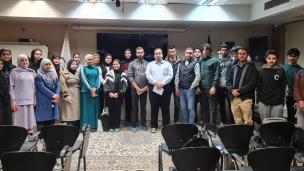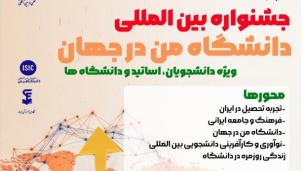|
Information and actions before, during, and after the exam: A: Information and actions before the exam 1. The student is required to provide access to the necessary software or hardware (Internet, personal computer, mobile phone, tablet, etc.) before the exam period. 2. The student is required to refer to his/her panel one week before the start of the exam period, and make sure that all his/her courses are defined. The student will be responsible for not informing the university if there’s a problem. Also it is necessary to follow up through the Department of Education if a course is not defined. 3. If the student does not have access to the Internet or other requirements for the online exam, it is necessary to make the required arrangements with the Department of Education (Mr. Saeedi) one week before the exam. 4. Students have to share their problems with the officer of the Department of Education, or the exam center experts and technical experts, knowing the announced contact number, before and during the exam. (Necessary numbers can be found on the website of the Vice Chancellery for Education, the website of the schools and the exam system). B: Information and actions close to the time of the exams 1. Students are required to enter the exam system 30 minutes before the exam starts, and if there is a problem in entering the system, they should immediately inform the officer of the Department of Education or the system expert. 2. The student is responsible for any delay in starting of the exam. 3. Before the exam starts, students are required to consciously complete the form related to the observance of ethical principles and activate it in the exam system. (A sample of a letter of commitment is attached). C: Information and actions during the exams 1. Students are allowed to participate in the exam up to 10 minutes after the start of the exam and it is not possible to enter the exam after this time. Obviously, the end of the exam for these examinees are similar to others and will not be given extra time. In other words, if the examinee wants to reach the final questions; it is necessary to answer the initial questions faster than the time allotted for each question. 2. If a student at the beginning or middle of the exam due to software or hardware problems (such as power outages, Internet disconnection, etc.) being disconnected, it is necessary to contact the exam center experts as soon as possible and coordinate and inform them for re-entering the system. Note: The maximum time allowed for reporting the disconnection of the Internet by the student to the exam expert is 5 minutes. If the student does not contact with the exam center experts, it is considered as not participating in the exam. Note: All conversations and requests of students in this contact will be recorded. (Any future objections will be reviewed relying on these documentations). 3. The possibility to return to previous questions and edit the answered question is provided for only 10% of the questions selected by the student. 4. Each question is placed on one page. D: Information and actions after the exams 1. If the student couldn’t participate in the online exam within the announced time, the decision about him/her will be made by the executive committee of exam after the submission of documents. Note 1: The mentioned students are required to submit their re-examination request in writing and with documents to the Department of Education no later than 24 hours after the exam, along with the reason for not participating in the exam, so that a decision can be made about their future status. In this case, the Department of Education, while checking the accuracy of the claim made by the student, if the statements are confirmed, will conduct a re-examination in-person or orally, or announce the incomplete grade of the course by holding at the first opportunity before the next semester. Note 2: The method of holding the re-examination will be based on the opinion of the relevant professor, and it is under the supervision of the University Department of Education. 2. In case of unjustified absence, according to the regulations, the student's score in the exam will be considered zero. 3. In case of any objections to the method of holding the exam, or the result of evaluation in different courses, the student, or the representative of each class is obliged to send his / her objection in writing to the Educational Deputy. 4. It is necessary that after the end of each exam, the questions along with the relevant answers be posted on the website of university by the exam unit. Evaluation of Online Exams According to the circular dated June 15, 2020 of the Vice Chancellery for Education of the relevant ministry, and in order to check the accuracy and health of the online exams, a number of results were randomly selected and will be compared with student’s previous grades (previous semesters and/or student’s other grades). If there is a significant difference and the violation is proven, the student will be dealt with according to the rules. Note: If the student's cheating is not proven and there is only a significant difference between the grades, he/she should take an oral exam and a decision about the student should be made according to the results and the professor's final opinion. Cases and Examples of Violations in Online Exams - Pursuant to Article 33 of the Student Disciplinary Regulations, cheating is the student's apparent use of information, equipment or facilities in an unauthorized manner, with the prior intent to provide the result of a required educational activity; The violator will be condemned to the punishment of paragraph 6 (in the relevant course or exams), and in proportion to the type of cheating disciplinary measures will be considered with one of the punishments of paragraphs 1 to 5. In case of repetition in addition to the punishment of paragraph 6, the student will be punished with one of the punishments of paragraphs 9 to 12. Moreover, according to Article 35 of the Disciplinary Regulations, and considering that the probability of contract cheating of taking exams by a person other than the main examinee in online exams is higher than other exams, if the student puts another student in the exam instead, he/she will be condemned with the punishment of paragraph 6 in the relevant exam, Or one of the punishments of paragraphs 9 to 12. Also, in case of repetition, the punishment can be intensified up to paragraph 14. - Regarding the sharing of questions or answers online, in compliance with Article 36 of the Disciplinary Regulations, the offender, in addition to being condemned to paragraph 6, shall be punished to one of the punishments in paragraphs 9 to 12, and in case of repetition, the punishment may be intensified to paragraph 14. - Some general indicators of violation are as follows: 1. Register in the exam with a fake identity, or participate in the exam session instead of the main examinee. 2. Helping other examinees to answer questions. 3. Collusion with other students or people. 4. Sharing exam questions or their answers with other examinees (such as social networks or online spaces). 5. The use of books, notes, pamphlets, and anything else which its use at the time of the exam is prohibited by the university. 6. Significant similarity in the descriptive answers sent by the examinees (at the discretion of the professor). 7. Similarity of photos, contents of files or multimedia content submitted by examinees. 8. Any violations in the field of IT that has been identified and approved by the representative of technical experts of university at the time of the exam. - Computer and telecommunication violations in the field of exams, Article 33 of the disciplinary regulations, is as follows: In case of committing any violations in the online space such as:
The offender is condemned to one of the punishments of paragraphs 4 to 10 in proportion to the violation. Note: If the violation is repeated, it should have wide dimensions. Depending on the level of impact of the violation, the punishment can be intensified up to paragraph 20. Guideline 1. It is recommended that students to have at least another computer or smartphone with them to take part in the exam, so that in case of any problems in working with the computer in use, after coordination with the experts of the exam center use the second device to enter the exam system. 2. Students are required to participate in a mock test announced by the university before the start of the exams period. It aims at acquainting students with the software environment, the exam process, and eliminating possible problems. Also, the student will be responsible for not participating in the mock test. 3. Students must receive their username and password before the start of the exams period. 4. Students are suggested to change their password the first time they login into exam system, and be sure to save their new password in an appropriate place. 5. The student is required to refer to his/her panel one week before the start of the exam period, and make sure that all his/her courses are defined. The student will be responsible for not informing the university, also it is necessary to follow up through the education department if a course is not defined. 6. When participating in the exam, it is recommended to plan in such a way that only examinee uses the Internet and other users (such as family members) delay using the same Internet line until the end of the exam time. 7. It is possible to take the exam via mobile phone, but a computer is more suitable for examining. To increase the security of the exam, students need to take exams only with computers. 8. Connect to the Internet and enter the exam system half an hour before the start of the exam and make sure that the hardware and software equipment required to participate in the exam are ready. 9. The deadline for protesting the grades is a maximum of 3 days after the temporary registration of grades in the university educational system. 10. Students can pause on each question up to 120 seconds. Note: The allotted time for questions is different from the pause time, and students should manage their time during the exam. 11. As the time allotted to each question is clear, no request will accept for extra time. 12. In case of viewing common IPs, and violating the rules, the student’s exam will be canceled and a score of zero will be considered.
|




